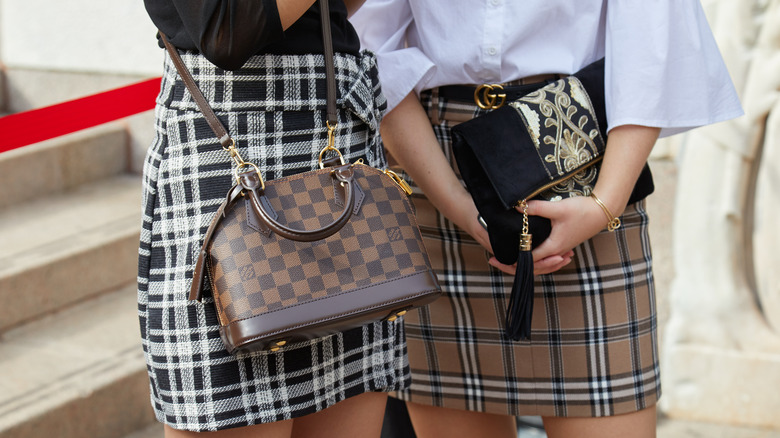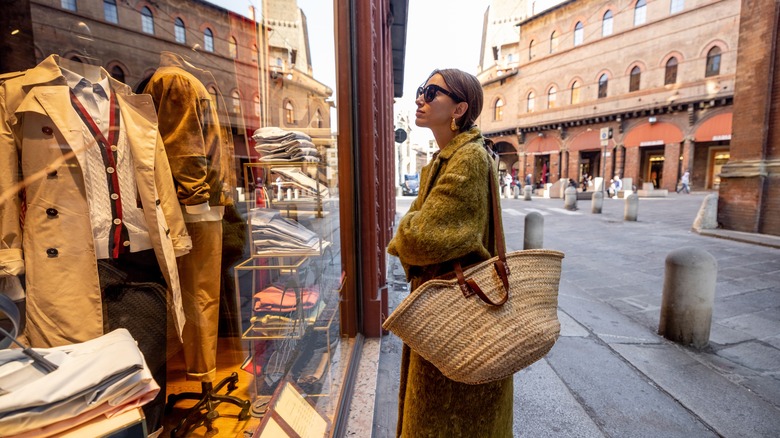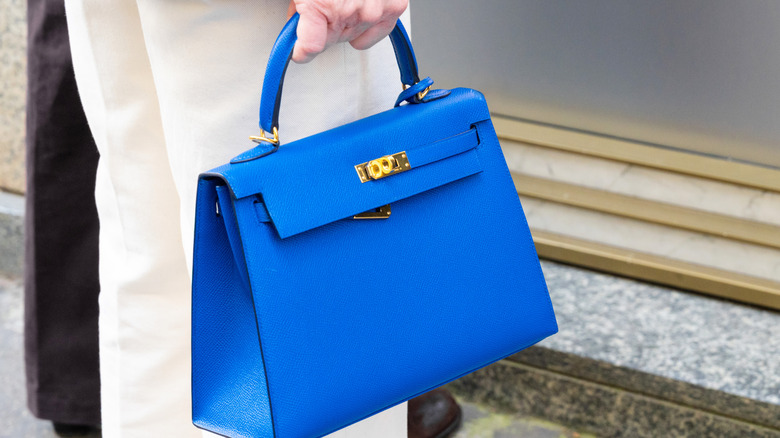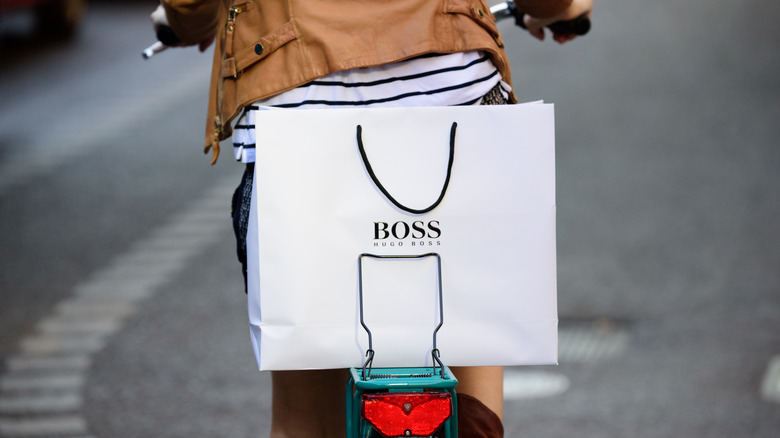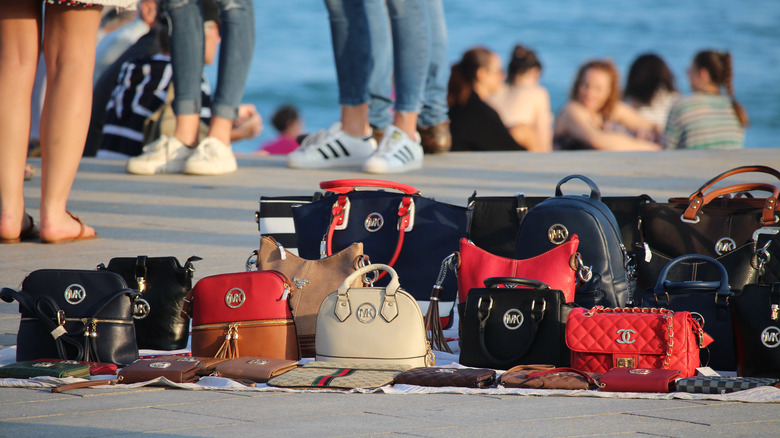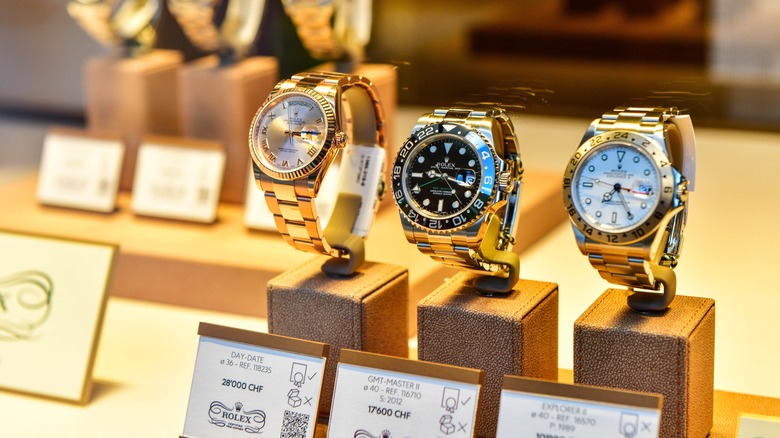Tourists Should Avoid Buying Or Bringing Fake Luxury Items To These European Countries
Traveling through Europe, you're bound to come across salespeople trying to sell you luxury bags for a good deal. You'll stroll past streets lined with tabletops brimming with world-famous brands wrapped in plastic at a fraction of the cost for the real deal. The friendly, albeit pushy salespeople are adept at talking passersby into making a purchase, claiming to have the same designer watches, sunglasses, purses, or perfumes at a better price. They often prey on tourists who don't know their European shopping haul could have some serious side effects. The faux Yves Saint Laurent crossbody bag did match your outfit quite nicely, after all. What harm could it possibly cause?
What seems like an innocent purchase on your travels may have major financial consequences. Toting a fake bag or flashing a fake Rolex may actually cost you more than if you purchased the authentic luxury product. In fact, law officials are cracking down on tourists purchasing fake luxury products in Italy, France, Germany, Spain, and Switzerland.
Apart from major fines, fake luxury products are not manufactured according to EU health standards and the chemicals, or coating on the products may actually be harmful to your health in the long term. For example, luxury brand sunglasses must have a UV filter on the lenses to protect the eyes, whereas the counterfeit versions don't have regulations or quality control requirements to meet. However, governments are policing the purchase of these knock-off products because sales are facilitated by organized crime groups, and illegal sales negatively affect the economy.
Italy
As much as you shouldn't leave Florence without purchasing some fine Italian leather, don't even think about trying to buy any knockoffs from street vendors. Italy has a strict financial legislation known as Legge Finanziaria, which is a finance law that protects consumers and industries in Italy. This also includes the luxury goods market and under this law, the sale and even purchase of counterfeit items is considered a serious offense.
Those found purchasing counterfeit products can face hefty fines of over $10,000. Italian authorities are checking high traffic shopping areas constantly, including airports, and confiscating knock-offs. So for the cost of the fine, you can certainly purchase a few real Gucci, Prada, or Versace bags and have the receipts to prove it. And what better place to treat yourself to these stunning designer goods than in the country where they were created?
France
Known for having some of the most vibrant shopping streets in the world, Paris is coveted as one of the fashion capitals of the world. Home to famous fashion houses such as Louis Vuitton, Chanel, Chloé, Christian Louboutin, and Dior, France is no stranger to top end luxury brands. Regrettably, it is also no stranger to top end counterfeits being made and sold on its streets to curious tourists looking for a good deal. Leading up to the 2024 Paris Olympics, police arrested 10 people at the Saint-Ouen flea market, and seized a staggering 63,000 fake items such as Louis Vuitton and Nike, which resulted in the closure of 11 stores.
French authorities are also checking airports and borders diligently to scope out any illegal fake goods being imported or sold. Customs seizes millions of knock-offs every year. The French Intellectual Property Code is instilled to prohibit anyone from being in possession of a counterfeit product, and fines can reach $8,000. Imports and exports can even lead to jail time. Save the hassle and financial heartaches and put your money towards some delicious French macarons instead.
Germany
Germans follow rules religiously, and that goes for busting counterfeit goods being distributed. The sale, possession, or transport of fake designer items is taken very seriously in Germany, and violations are met with little leniency. Under the German Trademark Act, authorities are known for conducting random checks at airports to look for tourists carrying fake items that may have been purchased for resale or distribution.
A hefty fine of over $5,000 can be dished out to those found in possession of fakes. While it may seem tempting to snag a great deal on a pair of fake Hugo Boss loafers, it's best to stick to the real deal. And if you're flashing any big brand names around, just be aware of your surroundings. There are also some specific destinations in Germany where you're most likely to get pickpocketed, so take care.
Spain
Spain may be considered a laid back destination, but they take the sale and purchase of fake designer goods extremely seriously. Spanish authorities have warned tourists not to purchase knock-off luxury brands on the streets, as it could land them in hot water. Tourist spots such as Mallorca, Costa Del Sol, and Marbella are a magnet for roadside fakes to be sold to people. Whether you're looking for a faux pair of Carrie Bradshaw's iconic Manolo Blahniks or a convincing Balenciaga bag, think twice before perusing the illegal vendors.
Undercover police officers are now hitting the streets, hoping to nab those buying or selling counterfeit goods. Article 274 of the Spanish Penal Code strictly prohibits the distribution and sale of fake designer goods. Those caught selling tend to have more serious risks and may face imprisonment of six months to four years. But your clothing choices could land you a huge fine in Spain, reaching up to $3,400 for buyers too.
Switzerland
The Swiss are known for exquisite scenery, divine chocolate, creamy cheese, and yes, Rolex watches. Half of all fake watches distributed are Rolex dupes and to the untrained eye, they can look extremely real. Desirable to many, affordable to few, Rolex has cemented its name in the luxury watch industry and, unfortunately, to the counterfeit market as well.
The Swiss Federal Act on the Protection of Trademarks and Indications of Source, or simply The Trademark Protection Act (TmPA), establishes the rights for trademarks holders and allows them to act legally on the ability to sue for infringement. Local Swiss authorities diligently check airports and border crossings, so think twice before trying to get your hands on a fake Rolex while visiting the Swiss Alps. Switzerland is already expensive, and you surely don't want to rack up a potential fine of $2,700 to put a damper on your trip.
